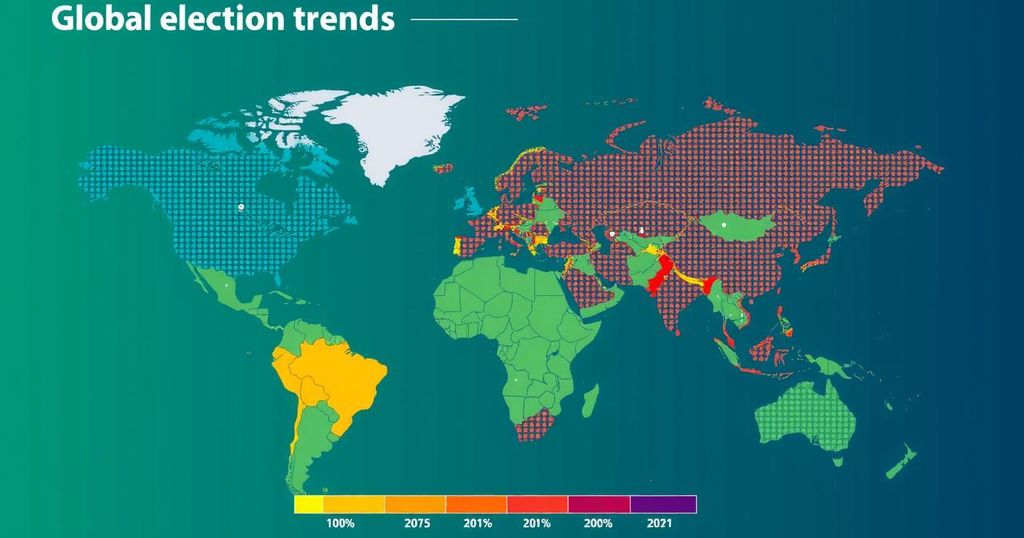Global Political Shifts Undermine Climate Action Commitment in 2024

The election year of 2024 has revealed a troubling decline in global commitment to addressing climate change, with significant political victories for climate-skeptical figures and a diminished public prioritization of environmental concerns. Despite record temperatures and related disasters, issues like inflation and populism have overshadowed climate discourse, culminating in a pessimistic outlook following the Cop29 summit.
In the unprecedented election year of 2024, a troubling global trend has emerged regarding climate action, with commitments weakening in numerous nations despite a backdrop of escalating climate disasters and record-breaking temperatures. Key political victories, such as those for Donald Trump in the United States, the ascendance of climate-skeptical factions within the European Union, and continued support for Vladimir Putin in Russia, highlight this shift in public prioritization. According to political analyst Catherine Fieschi, climate concerns, which peaked approximately five years ago during Greta Thunberg’s activism, have receded amid competing issues such as inflation and political instability related to global conflicts.
This year, anticipated to be the hottest recorded globally, has seen the climate crisis relegated to a minor electoral topic, with the exception of India, where extreme weather profoundly impacted farmers and influenced electoral outcomes. Voter sentiments show a turn towards right-wing parties that previously denounced climate action as financially burdensome, further complicating the climate narrative. Although Labour’s triumph over the Conservatives in the UK and the defeat of the far-right in France provide a counterpoint, the overarching narrative reflects a diminishing global momentum to confront climate change.
As political responses continue to align with populist pressures, prominent figures like Jan-Werner Müller caution against redefining climate issues within the context of cultural warfare. The recent Cop29 climate summit, which faced criticism for its lack of substantive progress on emission reductions and climate financing, underscores the deterioration of climate commitment from historically polluting nations. Activists and leaders alike have expressed frustration over the apparent indifference of major polluters in addressing the urgent climate crisis. The combination of these political dynamics and the scenario at Cop29 fuels pessimism regarding future climate progress, emphasizing the pressing need for decisive global action to mitigate climate change.
The 2024 election year, deemed unprecedented by the United Nations, reflects a global trend where the urgency to tackle climate change is being overshadowed by various political, economic, and social issues. Disasters linked to climate change have intensified, yet public commitment to addressing these challenges appears to have weakened. Political victories for figures skeptical of climate action illustrate a growing sentiment among voters that prioritizes immediate concerns, such as inflation and geopolitical instability, over long-term environmental strategies. This shifting focus is exacerbated by the rise of populist leaders and movements, which have influenced election outcomes in significant nations across the globe, diminishing previously robust advocacy for comprehensive climate strategies.
The significant electoral shifts observed in 2024 illustrate a troubling retreat from climate action across numerous countries, coinciding with a year marked by extreme weather events. While certain regions, such as the UK and France, experienced positive outcomes for climate-focused parties, the dominant trend points towards a prioritization of economic concerns over environmental ones. This combination of political maneuvering and lack of commitment showcased at the Cop29 summit raises concerns about the future of global climate initiatives, reinforcing the urgency for immediate and actionable policy changes in light of rising temperatures and environmental crises.
Original Source: www.theguardian.com





